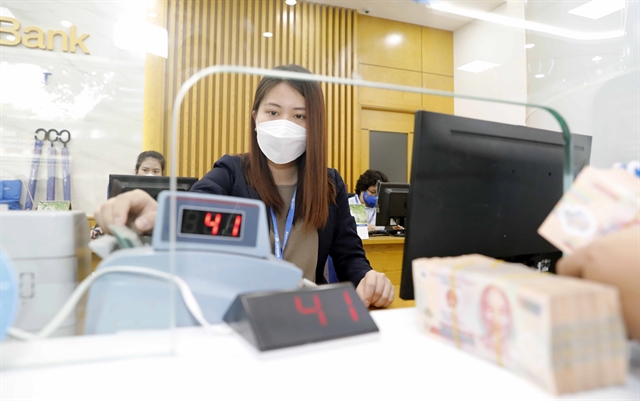Drastic measures needed to ward off financial crisis amid cash crunch, experts warn
Drastic measures are needed to ward off a “potential financial crisis” since most companies are struggling to raise funds amid the threat of defaulting on bond redemptions in the next few years, experts have warned.
 |
|
Transaction at Bảo Việt Bank's branch in Hà Nội. Cash is the biggest need of businesses right now. — VNA/VNS Photo |
Drastic measures are needed to ward off a “potential financial crisis” since most companies are struggling to raise funds amid the threat of defaulting on bond redemptions in the next few years, experts have warned.
“Cash is the biggest need of businesses right now, ” said Dr Cấn Văn Lực, member of the National Monetary and Financial Policy Advisory Council.
He said it is vital to settle all the various scandals involving bond issuances by major property developers and protect investors.
“Appropriate policies must be created based on international practices,” he said at a conference early this week.
Actions like debt rescheduling, tax deferral and increasing access to capital are all needed to resolve the difficulties faced by businesses, he added.
“Raising the credit growth cap [for banks] is one of the important solutions to deal with the problem of capital bottlenecks in the short term.”
Meanwhile, the Ministry of Finance has proposed allowing companies to extend bond maturities by up to two years if approved by bondholders owning more than 65 per cent of an issuance.
Experts said it is more challenging than ever for businesses, especially real estate enterprises, to issue new bonds.
A huge amount of maturing corporate bonds due for payment from now through 2024 is putting great pressure on issuers, mostly property businesses.
According to a report by credit rating agency FiinGroup, more than VNĐ35 trillion worth of bonds issued by property companies, mainly unlisted, will mature in 2022 and over VNĐ61 trillion in 2023.
Trương Tiến Dũng, standing vice chairman of the HCM City Food Association, said Vietnamese businesses would continue to face headwinds from rising global inflation and tightening monetary and stock market policies in 2023.
“It is really difficult for enterprises to tap any funding sources right now,” he said.
Food businesses are particularly struggling with global inflation, which has caused the prices of imported fuels, materials and components to surge, he said.
The need for cash is even more urgent since the 2023 Lunar New Year, the country’s biggest festival, falls in January, he said.
The banking sector should consider giving food companies priority in lending so that they can keep prices stable and help control inflation, he said.
Measures
Speaking at a recent meeting, PM Phạm Minh Chính stressed the Government’s determination to reform the bond, real estate and securities markets.
He promised that the rights and interests of the public and businesses would be protected.
The Government has already set up three committees to carry out reforms of liquidity and currency, the property market and corporate bonds.
The PM has instructed the ministry to submit measures to secure the financial market and investors’ rights before December 20.
He exhorted credit institutions to cut costs to be able to reduce loan interest rates for businesses and help spur economic recovery.
Credit will be given to priority sectors such as consumption, investment, exports, industrial property development, and social and workers’ housing development.
In a related move, the central bank recently raised the credit growth target for the domestic banking system by 1.5-2 percentage points from its previous target of 14 per cent, allowing banks to pump an additional VNĐ240 trillion into the economy.
The move comes after property and financial markets faced a credit crunch in recent weeks following increases in the interest rate.
Đào Minh Tú, deputy governor of the central bank, said lenders meeting liquidity requirements and offering low credit interest rates are prioritised for the increase in credit growth quotas this time.
Đỗ Thanh Sơn, deputy general director of VietinBank, said his bank’s cap has been increased by VNĐ20 trillion and it is focused on reducing costs to cut loan interest rates.








